Meet Senator Colin Deacon
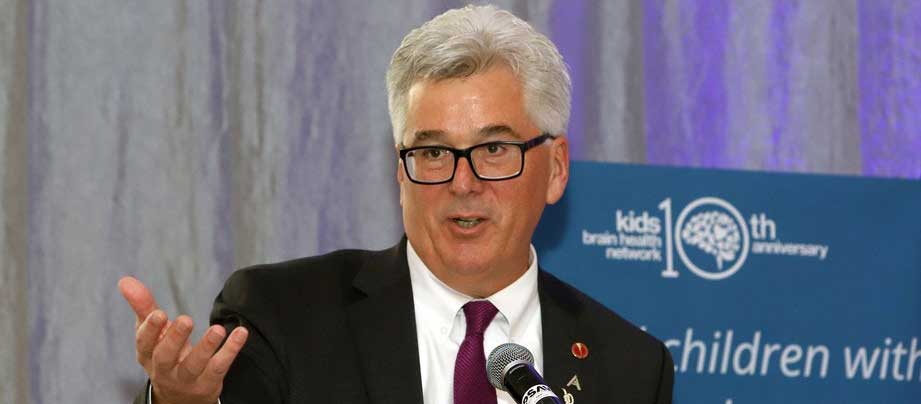
Senator Colin Deacon is used to making things happen. He spent years building companies as a tech entrepreneur and is determined to give that sector a voice in the Senate.
Appointed to the Upper Chamber in 2018 to represent Nova Scotia, Senator Deacon has served on the Senate Committee on Banking, Trade and Commerce and the Senate Committee on Agriculture and Forestry.
Who inspired you to get involved in public life?
My dad carried a powerful responsibility out of the Second World War. On the third last day of the war, one of his best friends was killed minutes after they decided what they each would do to make the world better. He was in politics for a period but found volunteering far more satisfying. Among other things, I’m immensely proud that my dad helped to create the Trans Canada Trail. To celebrate their 80th birthdays, my mom and dad bicycled 200 kilometres on the trail in each province and two territories.
Michael Chong, the member of Parliament for Wellington-Halton Hills, also inspired me when he brought forward the Reform Act, 2013. I thought it was a courageous and visionary first step toward creating a Parliament that would attract more Canadians to public life. After three years in Ottawa, I’m even more impressed by Mr. Chong’s efforts back in 2013 and 2014, and now see it as a tentative first step toward reducing partisanship and centralized control.
Lastly, I was inspired by Prime Minister Justin Trudeau’s hack of creating an arms-length process for selecting independent, non-partisan Senate candidates. I describe it as a ‘hack’ because he prototyped a solution that didn’t require constitutional change, legislation or a bureaucratic structure. That decision inspired me to apply. I wanted to make sure that the appointment process considered entrepreneurs — people who have turned ideas into opportunity, jobs and prosperity — as an important category of representation in the Senate. I never thought I would be appointed and had no idea how incredibly challenging this job would be, but I’m glad I got ‘the call’!
What is one thing most Canadians might not know about you?
I loved raising Scottish Highland cattle as a kid, starting when I was about eleven years old.
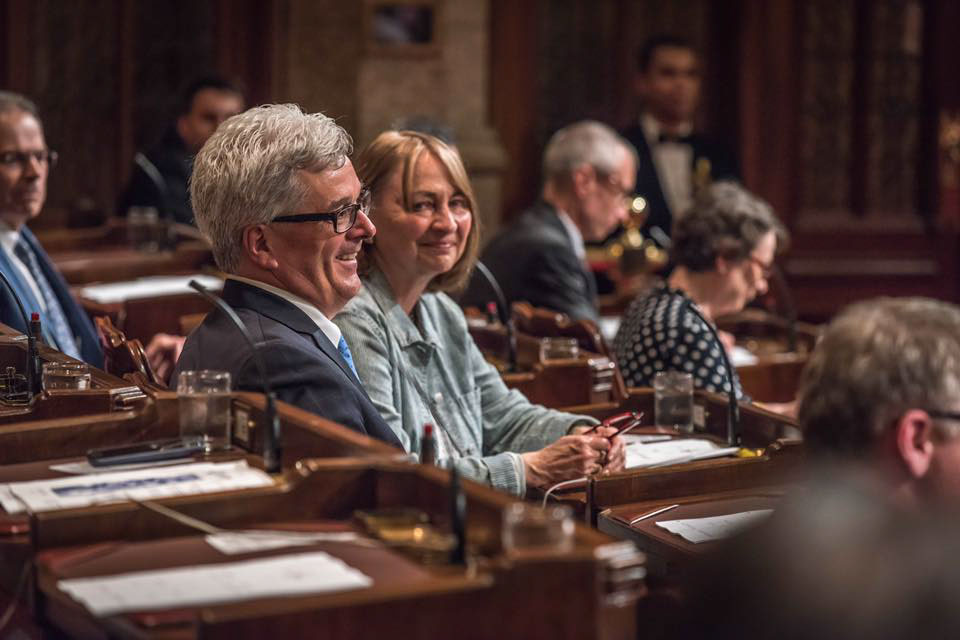
Senator Deacon with colleagues in the Senate Chamber following his swearing-in ceremony in June 2018.
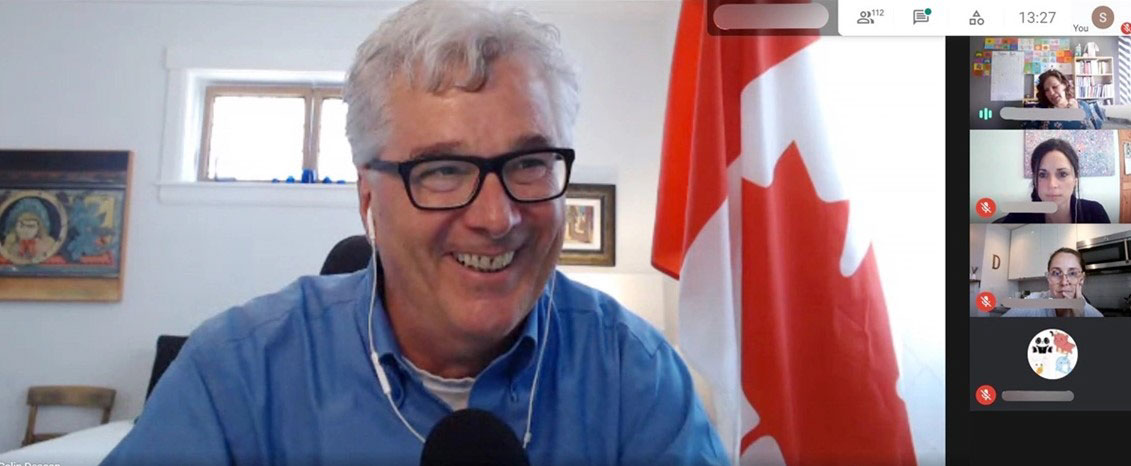
Senator Deacon connects with students from St. Brendan Catholic Elementary School in Stouffville, Ontario.
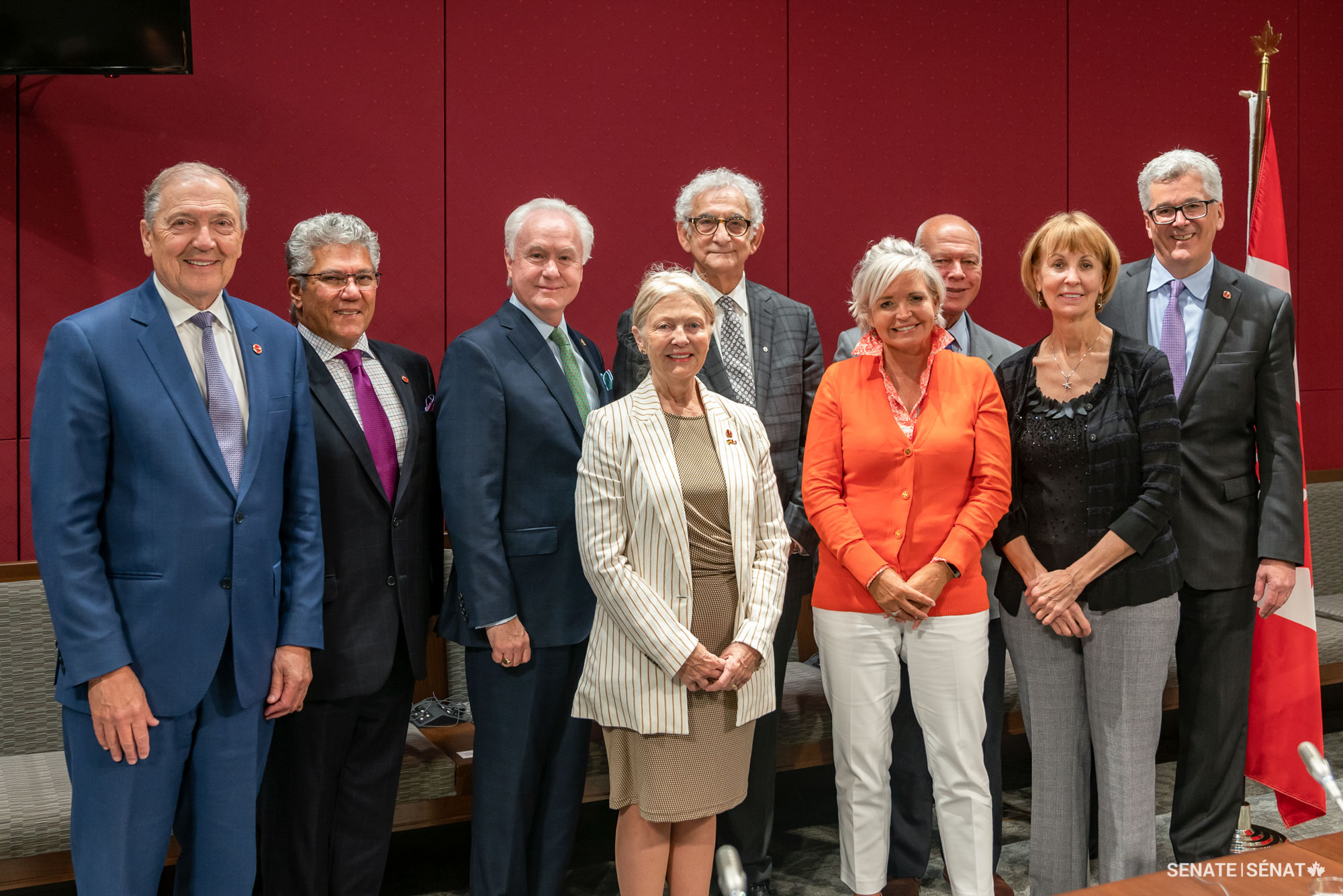
Senator Deacon (far right) poses with fellow senators who were members of the Senate Committee on Banking, Trade and Commerce in 2019.
Why should more Canadians care about what happens in the Senate?
The Senate has countless thoughtful, informed and inspiring debates on public issues and legislation. I’m so proud of that fact. Our debates reliably include a remarkable diversity of insightful perspectives. Also, because 80% of us are independent and most are non-partisan, I regularly learn more than I do from debates in the House of Commons. Too often, partisanship discourages collaboration and honest debate. It also causes many Canadians to disengage, which is unhealthy for democracy.
What legislative or committee work are you most proud to have participated in to date?
The Banking Committee’s study on open banking — which provides the legislative and regulatory authority for consumers to safely move their banking data from their bank to another accredited organization.
As a result, you can empower an institution other than your bank to look at your data and, for example, help you reduce costs, save money, improve your credit score or get an affordable loan. I continue to encourage swift and deliberate action at Finance Canada, especially because our current banking and credit systems too often work against marginalized groups, many of whom are highly creditworthy, but have low credit scores because they don’t have big incomes or many assets.
What do you think are the biggest public policy issues facing Canada today?
Climate change, digitization and recovering from COVID-19 are each massive issues, obviously. But, in addressing those and other challenges, my biggest concern is the culture in Ottawa.
John Cleese once said, “Nothing kills creativity as rapidly as the fear of making a mistake.” If you want to kill your career in Ottawa, as a public servant or a politician, make a mistake. As a result, the ability to innovate as we work on our biggest challenges is close to zero. Ottawa’s systemic fear of risk re-creates risk in a different form because it systemically suppresses the creativity and ingenuity that drive innovation and, consequently, our productivity growth and competitiveness – the source of our grandchildren’s future prosperity.
At the height of the COVID crisis we saw that change is possible. Mountains were moved in a matter of weeks. Hundreds of thousands of Government of Canada employees were given secure access to government systems from home and rose to the enormous challenge of creating the largest relief programs in Canadian history. In less than three weeks, the systems required to deliver Canadian Emergency Response Benefit (CERB) payments to millions of Canadians were implemented. Success demanded a digital-first approach and interdepartmental cooperation. New programs were launched and iterated in real time based on the needs of Canadians. It was inspiring.
Sadly, Ottawa seems to have reflexively returned to its pre-pandemic state of centralized control and a commitment to risk avoidance that preserves the status quo. If we are going to address climate change and prosper in the digital era, we must innovate, not just in business — in government.
You spearheaded the creation of the Senate’s environmental working group. Why and what impact do you hope it will have?
“Do as I say, not as I do” doesn’t sit well with me. Yet, sometimes legislators can be disconnected from the realities associated with the legislation we’re reviewing. The existential climate crisis demands that the Senate look at its own carbon footprint and work to beat Canada’s targets. We all need to prioritize climate action and first-hand experience will help us do a better job legislatively. It will also show it can be done — and that’ll give the Senate greater credibility as we hold others, especially government, to account.
What is a hidden gem in your region that more Canadians need to know about?
Our family are Nova Scotians by choice – we moved here in 2000. We absolutely love it and can’t pick just one gem. The spectacularly differing regions of our province include countless hidden gems. The likelihood of finding one increases with the bumpiness of the road.
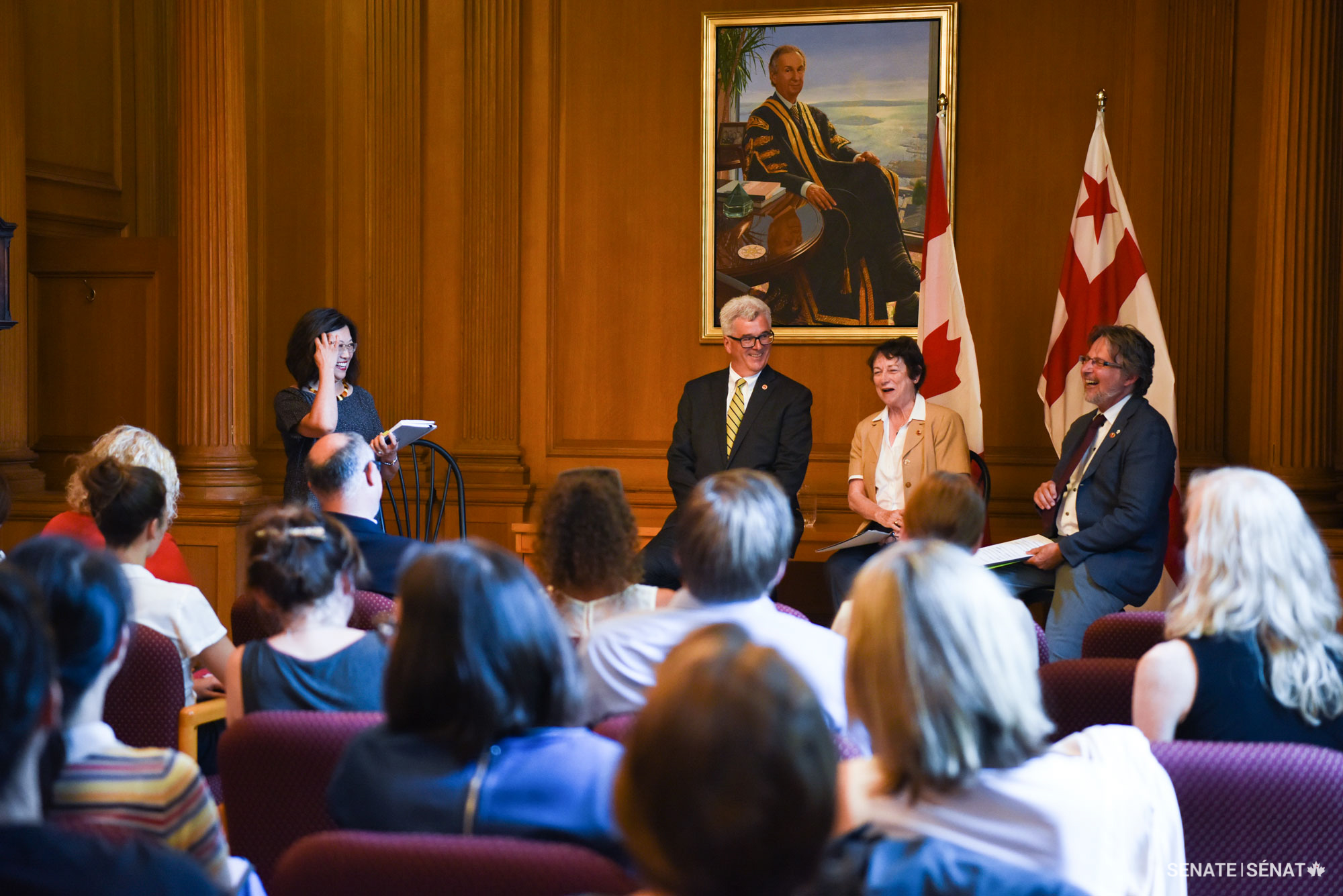
Senators Colin Deacon, Diane Griffin and Stan Kutcher speak about the work of the Senate Committee on Agriculture and Forestry at Dalhousie University in 2019.
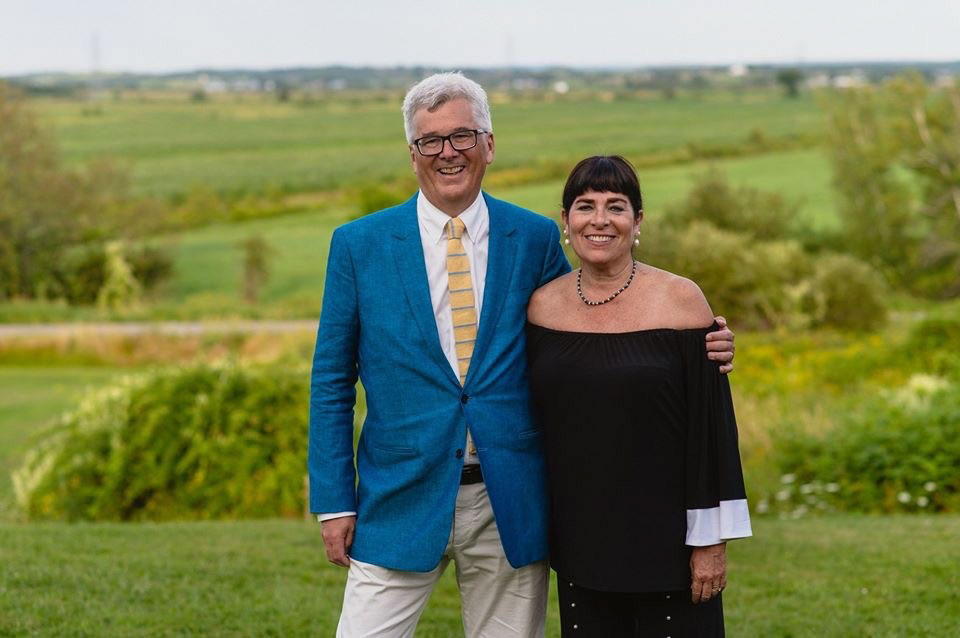
Senator Colin Deacon and his wife Jennifer pictured in Nova Scotia. The couple loves all the natural beauty the province has to offer.
Can you name a guilty pleasure song/album that always makes you smile?
Anything from a 1970s Canadian rock band like April Wine, The Guess Who, Chilliwack, Trooper, Rush, BTO or The Band.
What is the last book you read or movie you saw that you recommended to someone else, and why?
I’ll answer with one of the most memorable. It was Red Notice by Bill Browder who proposed the Magnitsky Act, now implemented around the world. I saw him interviewed in 2015 and immediately bought his book. It recounts his ongoing battle with Russian President Vladimir Putin and reads like a thrilling spy novel — but, because it’s a first-hand, non-fiction account of actual events, it’s frightening. The responsibility we have to help to preserve democracies around the world is profound.
Why are you proud to be Canadian?
Because we are not yet perfect, but we desperately want to be.
Related articles
Tags
Committee news
Meet Senator Colin Deacon

Senator Colin Deacon is used to making things happen. He spent years building companies as a tech entrepreneur and is determined to give that sector a voice in the Senate.
Appointed to the Upper Chamber in 2018 to represent Nova Scotia, Senator Deacon has served on the Senate Committee on Banking, Trade and Commerce and the Senate Committee on Agriculture and Forestry.
Who inspired you to get involved in public life?
My dad carried a powerful responsibility out of the Second World War. On the third last day of the war, one of his best friends was killed minutes after they decided what they each would do to make the world better. He was in politics for a period but found volunteering far more satisfying. Among other things, I’m immensely proud that my dad helped to create the Trans Canada Trail. To celebrate their 80th birthdays, my mom and dad bicycled 200 kilometres on the trail in each province and two territories.
Michael Chong, the member of Parliament for Wellington-Halton Hills, also inspired me when he brought forward the Reform Act, 2013. I thought it was a courageous and visionary first step toward creating a Parliament that would attract more Canadians to public life. After three years in Ottawa, I’m even more impressed by Mr. Chong’s efforts back in 2013 and 2014, and now see it as a tentative first step toward reducing partisanship and centralized control.
Lastly, I was inspired by Prime Minister Justin Trudeau’s hack of creating an arms-length process for selecting independent, non-partisan Senate candidates. I describe it as a ‘hack’ because he prototyped a solution that didn’t require constitutional change, legislation or a bureaucratic structure. That decision inspired me to apply. I wanted to make sure that the appointment process considered entrepreneurs — people who have turned ideas into opportunity, jobs and prosperity — as an important category of representation in the Senate. I never thought I would be appointed and had no idea how incredibly challenging this job would be, but I’m glad I got ‘the call’!
What is one thing most Canadians might not know about you?
I loved raising Scottish Highland cattle as a kid, starting when I was about eleven years old.

Senator Deacon with colleagues in the Senate Chamber following his swearing-in ceremony in June 2018.

Senator Deacon connects with students from St. Brendan Catholic Elementary School in Stouffville, Ontario.

Senator Deacon (far right) poses with fellow senators who were members of the Senate Committee on Banking, Trade and Commerce in 2019.
Why should more Canadians care about what happens in the Senate?
The Senate has countless thoughtful, informed and inspiring debates on public issues and legislation. I’m so proud of that fact. Our debates reliably include a remarkable diversity of insightful perspectives. Also, because 80% of us are independent and most are non-partisan, I regularly learn more than I do from debates in the House of Commons. Too often, partisanship discourages collaboration and honest debate. It also causes many Canadians to disengage, which is unhealthy for democracy.
What legislative or committee work are you most proud to have participated in to date?
The Banking Committee’s study on open banking — which provides the legislative and regulatory authority for consumers to safely move their banking data from their bank to another accredited organization.
As a result, you can empower an institution other than your bank to look at your data and, for example, help you reduce costs, save money, improve your credit score or get an affordable loan. I continue to encourage swift and deliberate action at Finance Canada, especially because our current banking and credit systems too often work against marginalized groups, many of whom are highly creditworthy, but have low credit scores because they don’t have big incomes or many assets.
What do you think are the biggest public policy issues facing Canada today?
Climate change, digitization and recovering from COVID-19 are each massive issues, obviously. But, in addressing those and other challenges, my biggest concern is the culture in Ottawa.
John Cleese once said, “Nothing kills creativity as rapidly as the fear of making a mistake.” If you want to kill your career in Ottawa, as a public servant or a politician, make a mistake. As a result, the ability to innovate as we work on our biggest challenges is close to zero. Ottawa’s systemic fear of risk re-creates risk in a different form because it systemically suppresses the creativity and ingenuity that drive innovation and, consequently, our productivity growth and competitiveness – the source of our grandchildren’s future prosperity.
At the height of the COVID crisis we saw that change is possible. Mountains were moved in a matter of weeks. Hundreds of thousands of Government of Canada employees were given secure access to government systems from home and rose to the enormous challenge of creating the largest relief programs in Canadian history. In less than three weeks, the systems required to deliver Canadian Emergency Response Benefit (CERB) payments to millions of Canadians were implemented. Success demanded a digital-first approach and interdepartmental cooperation. New programs were launched and iterated in real time based on the needs of Canadians. It was inspiring.
Sadly, Ottawa seems to have reflexively returned to its pre-pandemic state of centralized control and a commitment to risk avoidance that preserves the status quo. If we are going to address climate change and prosper in the digital era, we must innovate, not just in business — in government.
You spearheaded the creation of the Senate’s environmental working group. Why and what impact do you hope it will have?
“Do as I say, not as I do” doesn’t sit well with me. Yet, sometimes legislators can be disconnected from the realities associated with the legislation we’re reviewing. The existential climate crisis demands that the Senate look at its own carbon footprint and work to beat Canada’s targets. We all need to prioritize climate action and first-hand experience will help us do a better job legislatively. It will also show it can be done — and that’ll give the Senate greater credibility as we hold others, especially government, to account.
What is a hidden gem in your region that more Canadians need to know about?
Our family are Nova Scotians by choice – we moved here in 2000. We absolutely love it and can’t pick just one gem. The spectacularly differing regions of our province include countless hidden gems. The likelihood of finding one increases with the bumpiness of the road.

Senators Colin Deacon, Diane Griffin and Stan Kutcher speak about the work of the Senate Committee on Agriculture and Forestry at Dalhousie University in 2019.

Senator Colin Deacon and his wife Jennifer pictured in Nova Scotia. The couple loves all the natural beauty the province has to offer.
Can you name a guilty pleasure song/album that always makes you smile?
Anything from a 1970s Canadian rock band like April Wine, The Guess Who, Chilliwack, Trooper, Rush, BTO or The Band.
What is the last book you read or movie you saw that you recommended to someone else, and why?
I’ll answer with one of the most memorable. It was Red Notice by Bill Browder who proposed the Magnitsky Act, now implemented around the world. I saw him interviewed in 2015 and immediately bought his book. It recounts his ongoing battle with Russian President Vladimir Putin and reads like a thrilling spy novel — but, because it’s a first-hand, non-fiction account of actual events, it’s frightening. The responsibility we have to help to preserve democracies around the world is profound.
Why are you proud to be Canadian?
Because we are not yet perfect, but we desperately want to be.


